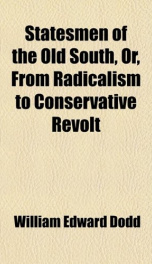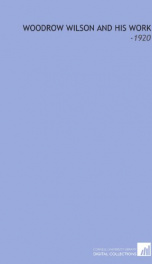statesmen of the old south or from radicalism to conservative revolt

Purchase of this book includes free trial access to www.million-books.com where you can read more than a million books for free. This is an OCR edition with typos. Excerpt from book: JEFFERSON DAVIS TO speak kindly of Jefferson Davis, even a[ half-century after the events which he helped to bring about, is an exceedinglyji risky thing. Somehow or other, mankind re- . quires scapegoats; somebody must be punished for the mistakes of the race or the nation, and no better way has been found than to pick out some conspicuous individual, usually innocent and sometimes even harmless, and lay upon him the burden of shame and guilt for great calamities which have come as a result of the general sinning. I shall not here and now enter upon a defense of this system nor even of the innocent victims of it in history, but only remark that we have adopted the system in America, that we like it and that there is no telling when some of us may be pounced upon by our community or our country as a scapegoat. Jefferson Davis was a scapegoat and he bore upon himself the marks of the general disapproval until he was laid to rest in his tomb in romantic Hollywood cemetery on the banks of the James. Keeping this idea in mind I think we may profitably study the remarkable career of the man who headed the greatest revolt in human history and whose work came nearer to success than that of any other who finally failed. / Jefferson Davis was like Lincoln, born on the Kentucky frontierin the Green river valley, whence his parents had gone from Georgia in search of a better station in life and some lands for their tribe of children. Pioneers, especially Kentucky pioneers, seem to have won the special approval of Providence if Providence approves of large families. Henry Clay's mother gave seventeen sons and daughters to old Kentuckythere was a clan of Clays; Chief Justice Marshall's father carried thirteen children to his new home in the West and Samuel Davis, though not blessed...
Info about the book
Author:
Series:
Unknown
ASIN:
B002IZSRDM
Rating:
3.5/5 (2)Your rating:
0/5
Languge:
English
Users who have this book
Users who want this book
What readers are saying
What do you think? Write your own comment on this book!
write a commentif you like statesmen of the old south or from radicalism to conservative revolt try:
Do you want to read a book that interests you? It’s EASY!
Create an account and send a request for reading to other users on the Webpage of the book!






